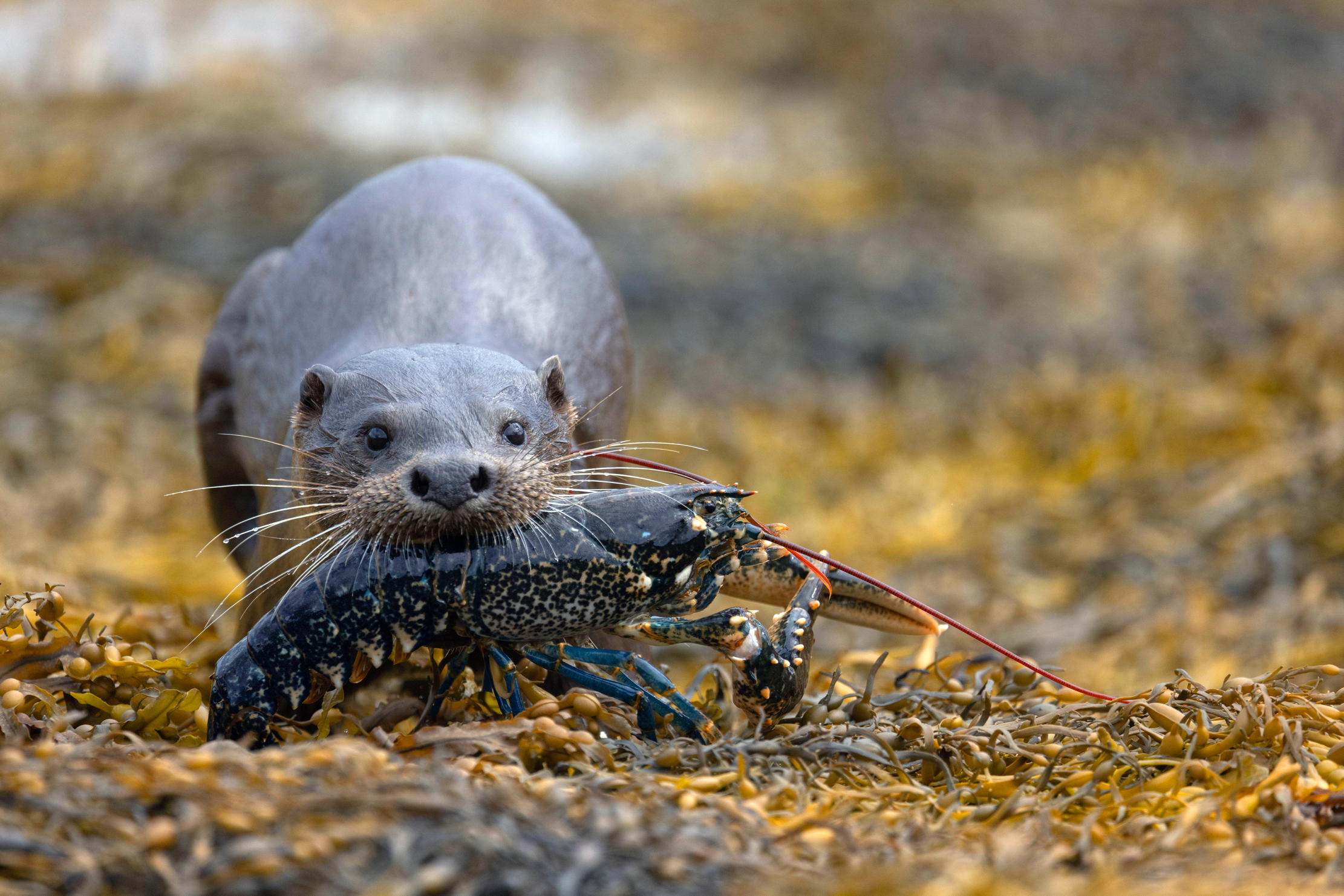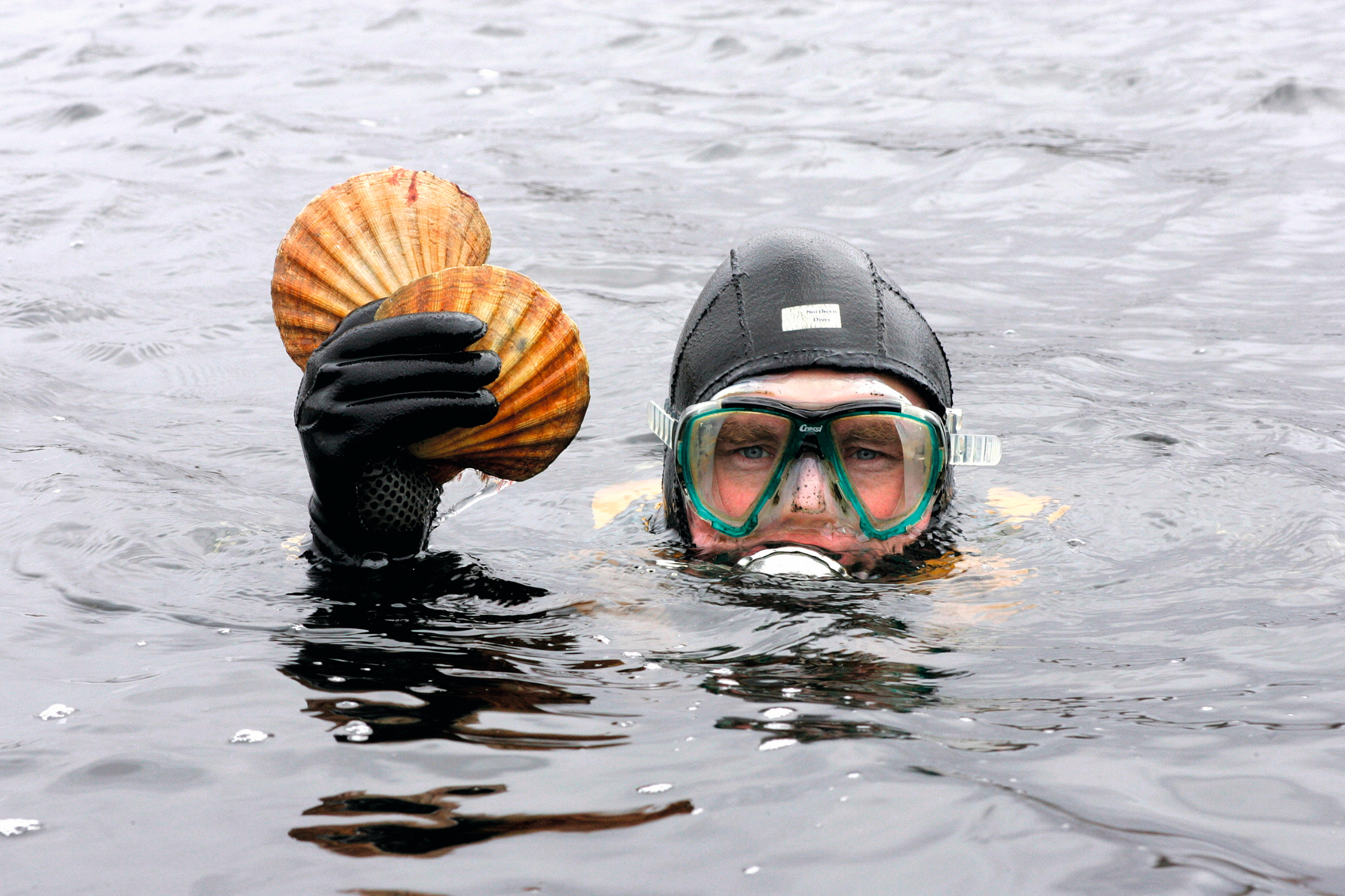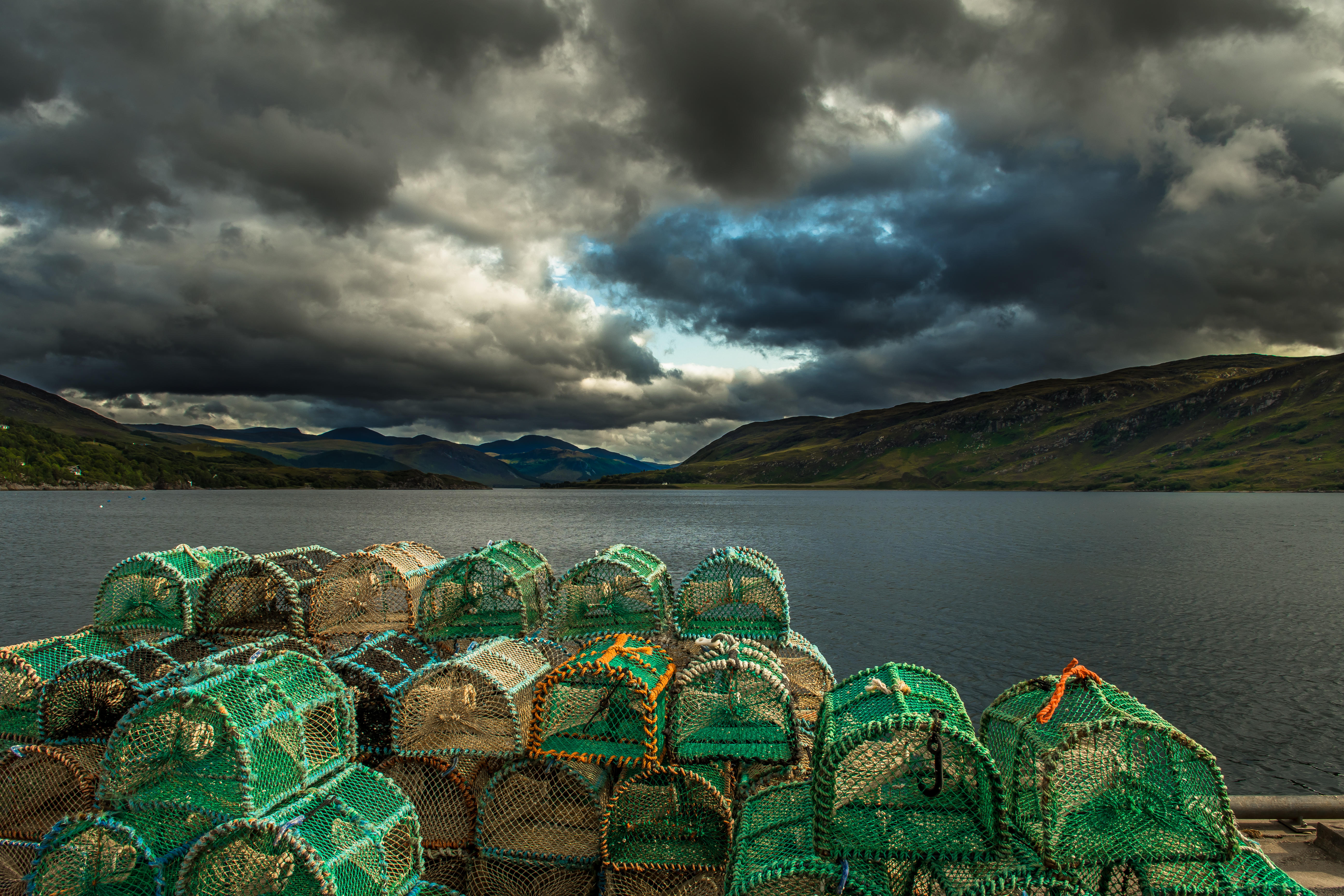Come shell or high water: Rugged coastlines, surging tides and deep, cold water put Scottish shellfish in a class of its own
Nick Hammond heads north to taste his way around some seafood hotspots.


'Look at this!’ exclaims Michael Tait, sweeping his yellow-wellied foot left and right across the jetty. ‘Who’d have thought there were so many crabs down there!’
His boot is clearing hundreds of legs, pincers and carapaces from crabs caught in the indigo depths of the beautiful Vaila Sound in the south-west of Shetland. The remains are the work of sea otters that snooze, lunch and cavort only a few feet from Michael's office door at Shetland Mussels. ‘I see them all the time, they’re not bothered by us,’ he continues. ‘And they don’t eat the mussels.’
Eider ducks apparently do, however; shells and all. But then the killer whales eat the eider ducks — so Michael isn’t too worried. These are only some of the daily considerations woven into mussel farming in the vast depths of Shetland’s voes or lochs. Sparsely populated, far flung and unpolluted, these waters make Scotland one of the world’s great shellfish havens.
Plump, sweet mussels are grown on farms across the region on enormous ropes that stretch down 50ft or more. Michael sets nearly 2,000 miles of rope across several sites on the island, each encrusted with mussels like bristles on a beard. They descend into the dizzying depths as we chug through a stiff breeze, past snoozing seals and raiding parties of opportunist eiders. The aforementioned orcas are often seen around Shetland, indicating the purity of the water and the subsequent abundance of marine life. They’ve even been seen cruising between mussel ropes like oversized lane swimmers in a lido.
'A raw mussel looks like the very Devil, but tastes divine'
A raw mussel looks like the very Devil, but tastes divine: sweet, fresh and subtle. I slurp them straight from the briny waters, tossing the shells back overboard. As well as being low in calories, packed with easily digestible protein, vitamins, minerals and omega-3s, they also sieve plankton and clean the nutrient-rich currents. Plus, they sequester carbon by the bucketload in a quiet, unassuming way.
Hardy pioneers started mussel farming here in the 1990s and have since proved the viability of a scheme that is making waves in sustainable aquaculture. Thousands of tons of mussels are shipped annually across the Continent from Scottish waters, an exciting possible alternative to the ubiquitous Scottish salmon.
‘I started off life as a ship’s cook at 16, being seasick when having to cook the rest of the crew’s greasy fry-ups,’ laughs Michael Laurenson of Blueshell Mussels near Brae. His smart offices enjoy panoramic views of the magnificent St Magnus Bay. The two state-of-the-art and well-equipped mussel boats, the sorting, grading and packing facilities and the scores of local employees are a far cry from early days. ‘I’ve always been a fisherman, never wanted to do anything else,’ he confirms in a soft lilt, which offers a nod to the Nordic history of these islands; Norseman colonised Shetland from the 9th to the 14th centuries and their influence is felt to this day, most clearly at Up Helly Ha, an annual fire festival. ‘I worked my way up to skipper of my own boat, but times were hard for fishermen back then and I lost the lot. It was a last throw of the dice to try mussel farming: I put our house up as collateral to get started.’
Exquisite houses, the beauty of Nature, and how to get the most from your life, straight to your inbox.

That was more than 25 years ago. These days, Mr Laurenson is director of the Scottish Shellfish Marketing Group, a commercially successful conglomerate of shellfish farmers that pools its skills and resources to promote what it has to offer to the wider world, as well as closer to home. Archaeology suggests that seafood has always been a key part of the Scottish diet; but, more recently, Scottish enthusiasm for native shellfish seemed to be on the wane. Happily, the tide has now turned.
‘It wasn’t that long ago that you couldn’t even find much of it in Scottish restaurants,’ laments chef Tom Kitchin, shaking his head. ‘People hardly ate it at all for a while — we sent the whole lot off abroad. Incredible.’ We’re talking, appropriately, in the kitchen of The Kitchin, his Michelin-starred homage to Scottish produce in Leith, Edinburgh, back on the mainland.
I’m surrounded by baskets of fat, fresh mini ‘cocktail’ oysters, crow-black clusters of mussels and glorious fans of meaty scallops, still proudly in their shells. Later, Tom will use those shells as cooking vessels to bake Orkney scallops with a fragrant splash of vermouth, white wine, vegetables and herbs. The rim is sealed with a rope of pastry, designed to be gently removed and nibbled. ‘Scottish seafood has so much to offer,’ he enthuses. ‘It’s a joy to cook with: as chefs, we couldn’t ask for anything more on our doorstep.’
'I’ve been fishing for and eating our langoustine for 40 years. I’m proud that they are known for their superb eating quality — both here and abroad'
Another champion is Clare Welch of Welch Fishmongers of Newhaven, Edinburgh, a quay-side treasure trove packed to the gunwales with the freshest possible shellfish. ‘The skipper will call us to let us know when he’s coming in,’ she laughs. ‘It’s a pleasure for us to offer our customers seasonal fish and shellfish as fresh as it’s possible to have it.’ Clare has long supplied seafood specialists Ondine in St Andrews and the two have paired up to create The Fishmarket, right next door to the fishmongers. You can enjoy imaginatively prepared and spanking-fresh shellfish within a stone’s throw of the lapping waves.
Scotland’s wealth of shellfish is unrivalled, from day-boat-caught brown crab and lobster to hand-dived scallops. These fetch a premium compared with those dredged, partly because fewer are harvested by this labour-intensive form of sustainable fishing and partly because there is increasing concern about dredging, which uses weighted nets to scrape scallops (and by-catch) from the sea floor.
Then there are kreel-caught langoustines, of which Scotland is the world’s largest producer. Ian Wightman has been catching them for more than 40 years on the Clyde. Kreels are similar to crab or lobster pots, catching langoustines alive and with less potential damage than dredging. Ian is part of the Scottish Langoustine Scheme, which protects resources and supports the industry.
Some 70% of Scottish langoustines are still sent overseas and Ian is a passionate advocate for them: sweet and meaty, their shells are unrivalled for making stock for bouillabaisse. ‘I’ve been fishing for and eating our langoustine for 40 years,’ he attests. ‘I’m proud that they are known for their superb eating quality — both here and abroad.’

As mussels are, Scottish oysters are going from strength to strength. Winston Brown discovered a midden of Native oyster shells underneath the floor of the Shetland crofthouse barn in Weisdale Voe he was bequeathed. The croft has been in the family for hundreds of years and Winston wondered how he could turn it into a viable business concern. ‘I began experimenting with Native oysters, as well as Pacifics,’ he explains, as he grades the latest specimens, waist deep in tidal water.
Native oysters are indigenous to Europe, as their name suggests, and they were once so sought after that Romans shipped them from Colchester back to Italy, before a combination of overfishing and a disease that singled them out devastated local populations. The Native is now only found in any numbers on the Iberian peninsula in Spain. Gigas, or rock oysters, were introduced into the UK in the late 1800s to make up the shortfall. Incidentally, the saying that oysters should only be eaten with an ‘R’ in the month applies solely to Natives: rock oysters are available all year round.
‘The Natives have taken beautifully,’ Winston says, as squalls race across the voe’s surface and a double rainbow celebrates his tenacity. ‘We already sell Pacific oysters and will be able to begin selling Shetland Natives in a few years. They once grew in their thousands in this very spot, before they were fished out.’
Scottish shellfish really is one of the great treasures of our island nation. All hail those who care for, catch and consume it.

James Fisher is the Digital Commissioning Editor of Country Life. He writes about motoring, travel and things that upset him. He lives in London. He wants to publish good stories, so you should email him.